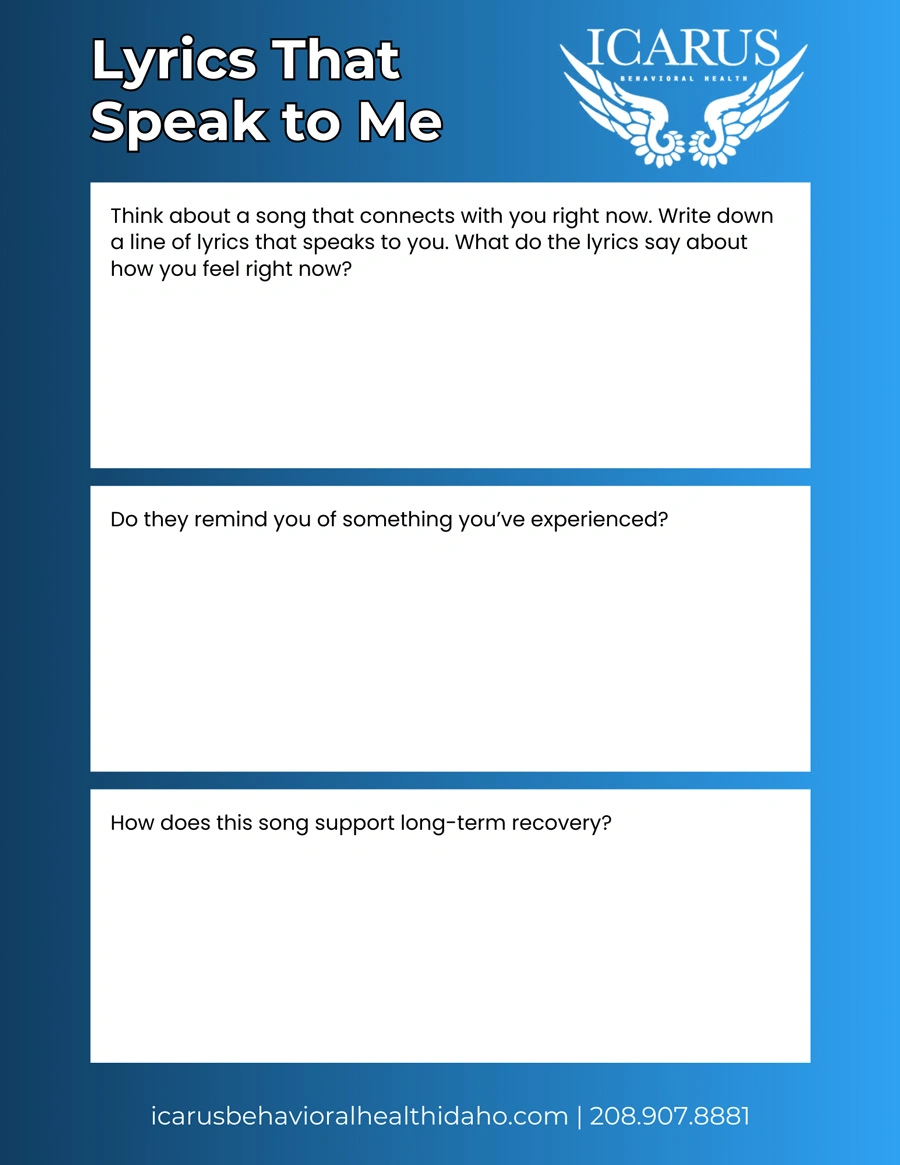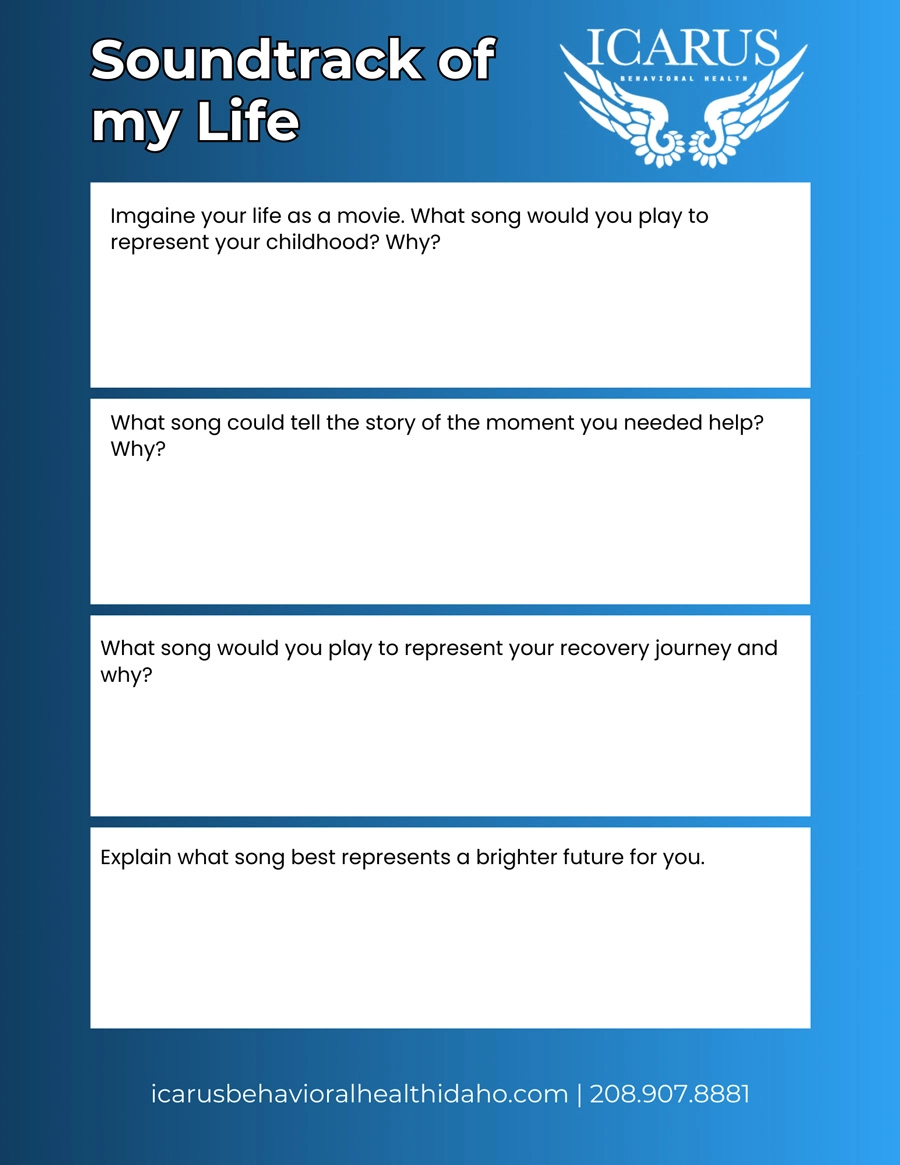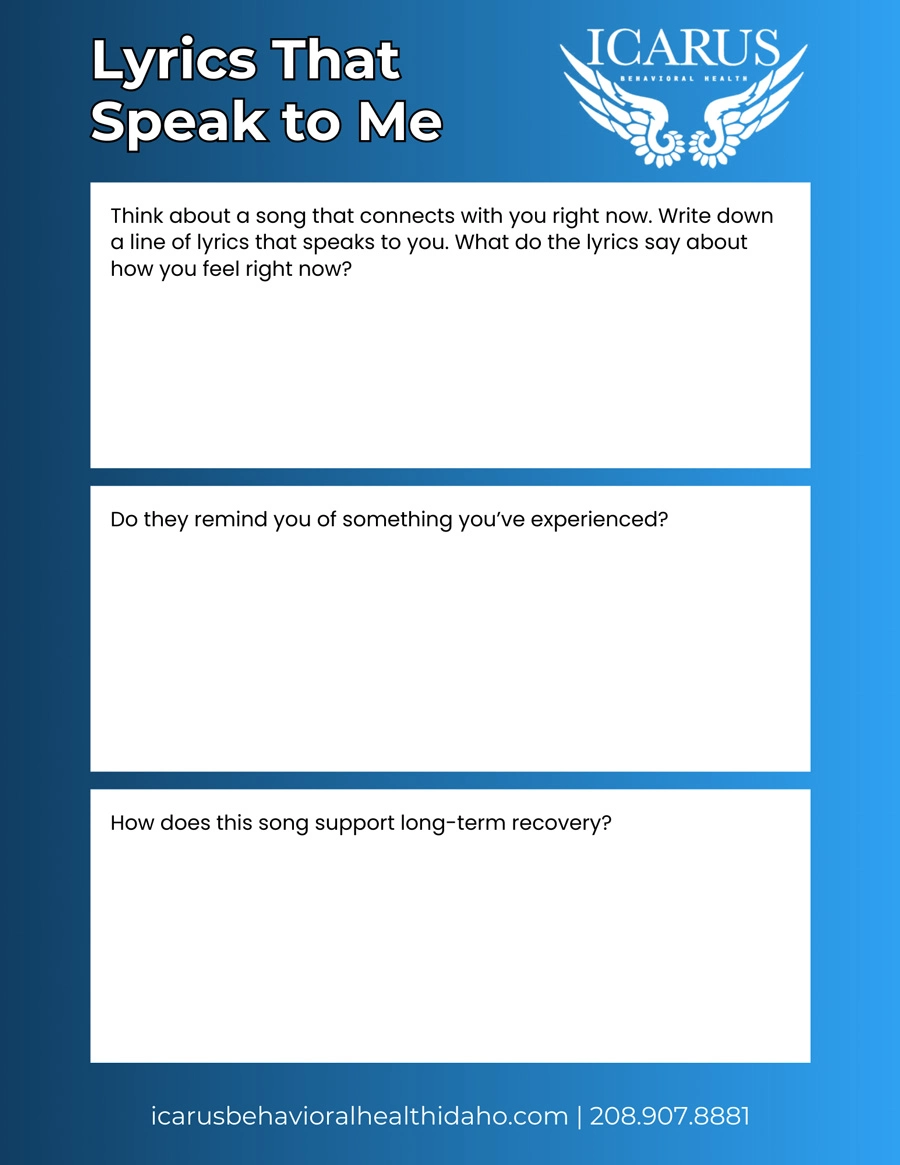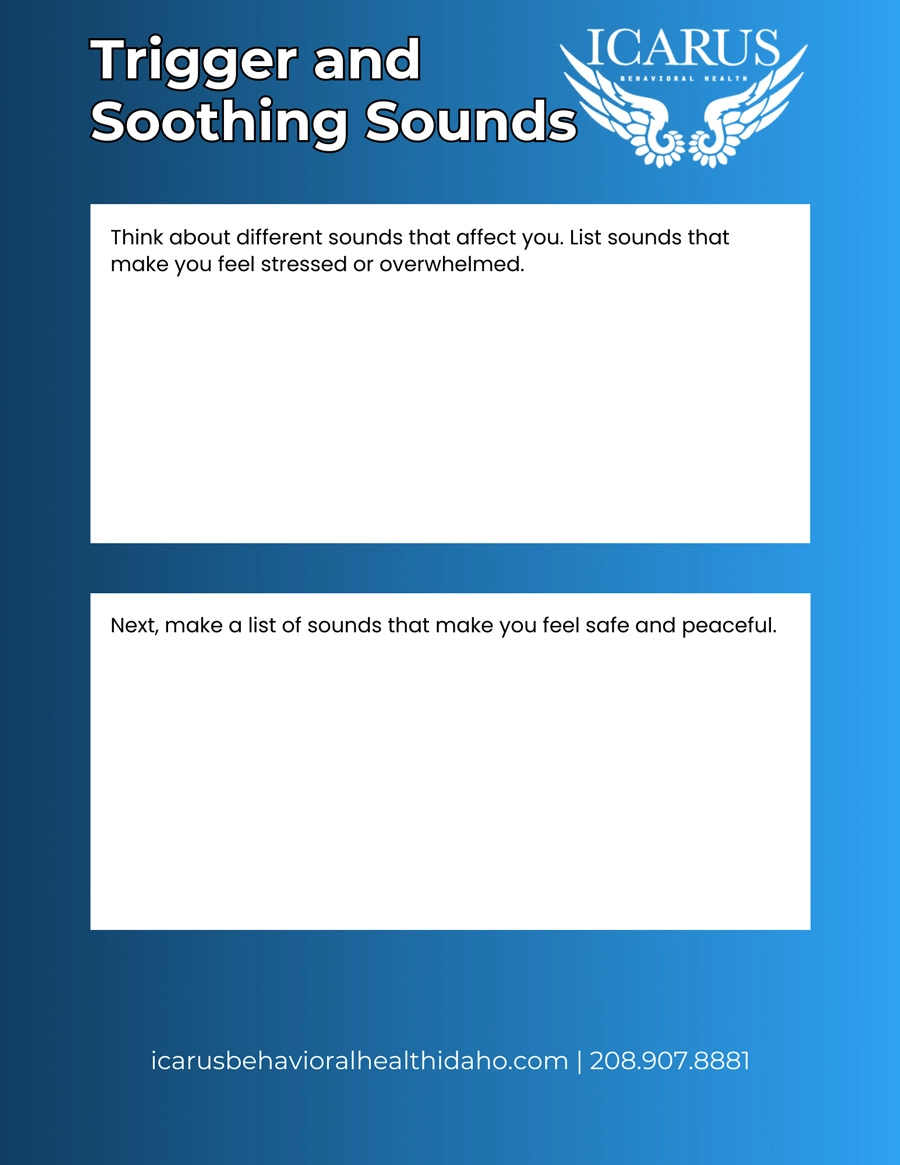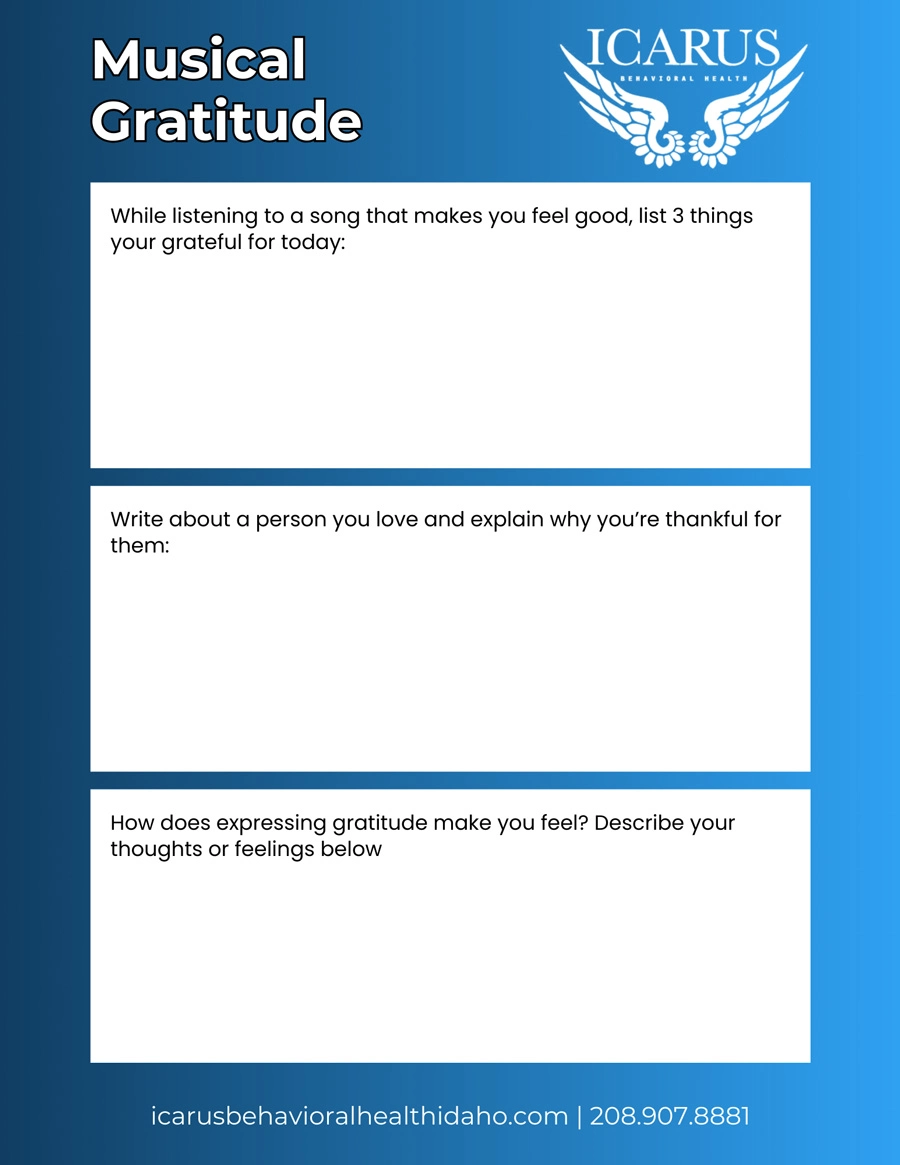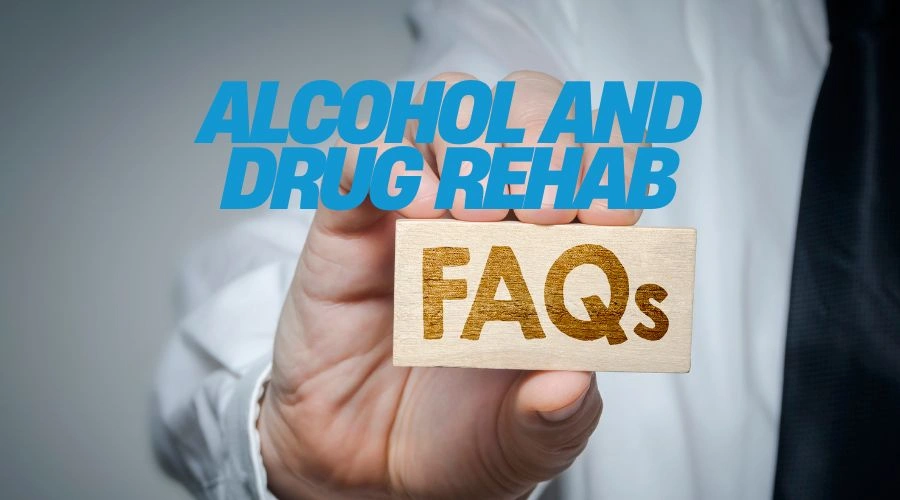Downloadable Resources on Music Therapy for Addiction and Mental Health
Music therapy sessions led by trained mental health professionals integrate perfectly with other components of the therapeutic process. Most clients who participate find it enjoyable, as it helps them reduce stress in a more informal environment than many other therapies. Our music therapy worksheets can be incredibly helpful if you want to try it, but don’t know how to start.
The music therapists at Icarus Behavioral Health Idaho understand that music therapy can lead to personal growth and emotional awareness. Aligning with the principles of positive psychology, music therapy is one of the many tools we use to help people end addiction and enjoy better mental health.
We invite you to read on to learn more about the psychological benefits of music therapy and download our free music therapy worksheets and exercises from our site.
Get Accredited Treatment Programs at Icarus Idaho
Music Therapy Worksheets for Self-Expression and Stress Relief
Our music therapy worksheets give anyone new to the process a great opportunity to try it. In a professional treatment setting, these exercises are often completed as part of group therapy sessions. However, they can also encourage relaxation and help you explore feelings if you complete them alone.
After you download and complete your music therapy worksheets, you can share them with your counselor or therapist. The information in the worksheets can help teach you new ways to cope with your triggers.
One client shared a tip. She saved and added her worksheets to her browser favorites for quick access. The client explained that one day, for example, she felt like drinking alcohol, but quick access instead of a search for the worksheets and her playlists helped her avoid a relapse.
If you are in search of a professional to help with your mental health, feel free to call Icarus Idaho for a consultation. It’s confidential to speak with us.
Music Therapy Session 1: Build a Playlist to Match Your Emotions
Reflect on the songs that speak to your feelings. They may not be best-sellers that top the charts; they might be lesser-known songs that evoke good memories and can help heal anxiety or depression. The worksheet asks you to act on each of the following prompts to make playlists to meet each moment in life:
- List a favorite that you might play when you feel anxious.
- Note the music that you might listen to when feeling hopeful or happy.
- List some tunes that might play to boost your mood in moments of sadness or depression.
The brain perceives and accesses music in several regions, making it a powerful therapy resource. Whether you are singing along to one of the songs you listed or would enjoy listening to the latest version on your playlist, you’ll have a ready-made list of the tunes that can help you feel better.
Music Therapy Worksheet 2: Setting up the Soundtrack of Your Life
In the next exercise, you’ll imagine what would happen if you created the soundtrack for your life story. Clients enjoy this activity, as it encourages them to consider the emotions they’ve experienced throughout life with acceptance. This worksheet then challenges clients to visualize an image of the future.
You’ll express your thoughts on the following in this session:
- What score in your life’s movie would represent your childhood?
- What music tells the story of the moment you knew you needed help?
- What score represents your recovery journey and why?
- Explain a song that represents a brighter future.
As you search for the right pieces for this musical playlist, consider how you’ll match the music’s emotions to your emotional phases in life.
Music Therapy Session 3: Lyrics That Speak to Me
Each client has unique musical preferences, with some exploring many forms from classical to punk rock, rap, or country music. This session is all about lyrics, regardless of genre. You will think about a song that connects with you because the lyrics tell your story. You’ll:
- Explain what the lyrics say about your feelings right now.
- Start exploring whether they remind you of something in your past.
- Consider how the lyrics can support long-term recovery.
Music is an excellent communication tool. It’s so often used with children and adults who struggle with mental health because it can say just the right thing, especially when someone is unable or not ready to talk about things.
Music Therapy Worksheet 4: Identify Triggers and Ways to Self-Soothe
Everyone needs coping tools to manage stress and anxiety. Those struggling with mental illnesses sometimes struggle to identify their triggers – the first step to dealing with them. This resource sheet helps you gain a better understanding through music. You will consider how different sounds may contribute to your emotional state, then:
- List any sounds that make you feel overwhelmed (common in ADHD, autism, or PTSD).
- Note sounds that can support your inner peace and calm you.
The next time you find yourself in a noisy, overwhelming space, you can check this list you’ve created and download your soothing playlist for an instant calming effect.
Music Therapy Worksheet 5: Musical Gratitude
Therapists often work with clients on increasing gratitude, which replaces toxic feelings and thoughts with positive thinking to create emotional resilience. This worksheet helps you express the reasons you’re grateful while listening to music. While listening to a feel-good tune, you will:
- List 3 reasons you’re grateful today
- Write about a loved one and explain why you’re thankful for them.
- Describe your thoughts about how expressing gratitude makes you feel.
Music-based gratitude sessions can help train the brain to prioritize downloading positive thoughts and avoid negativity biases in the future, as well as help cope with childhood trauma for some clients with trauma histories.
Positive Psychology and Professional Music Therapists
Music therapy connects closely with the principles of positive psychology, which focus on physical and mental well-being, emotional strength, and better relationships. Music therapy is an evidence-based treatment method that came from the clinical and rehabilitative fields.
Here are some ways it overlaps with positive psychology:
- Promotes positive thinking, gratitude, and happiness
- Enhances social engagement with peers
- Builds strength and resilience
- Supports personal growth through self-expression
- Increases listening skills and positive communication
Although Icarus Idaho only treats adult age groups, music therapy is also effective for children and adolescents. Singing and moving to a fun beat can benefit students or young people who don’t have the words to express their pain and trauma.
While music teachers are not therapists, they often positively impact students’ understanding of their emotions without even realizing it. For example, a young child forms behavior by playing; adding music can enhance their experiences by helping them recognize emotions they don’t yet know how to express.
Up To 100% of Rehab Costs Covered By Insurance
Call Our Mental Health Professionals for Lasting Treatment
Are you in search of treatment for a mental health concern? Icarus Behavioral Health’s Idaho site is an accredited treatment center that can help you heal emotional pain. We take a holistic approach that addresses both the physical and mental wellness to help you process your feelings and enjoy a fuller, happier future.
Call us today for information on how we can help.


